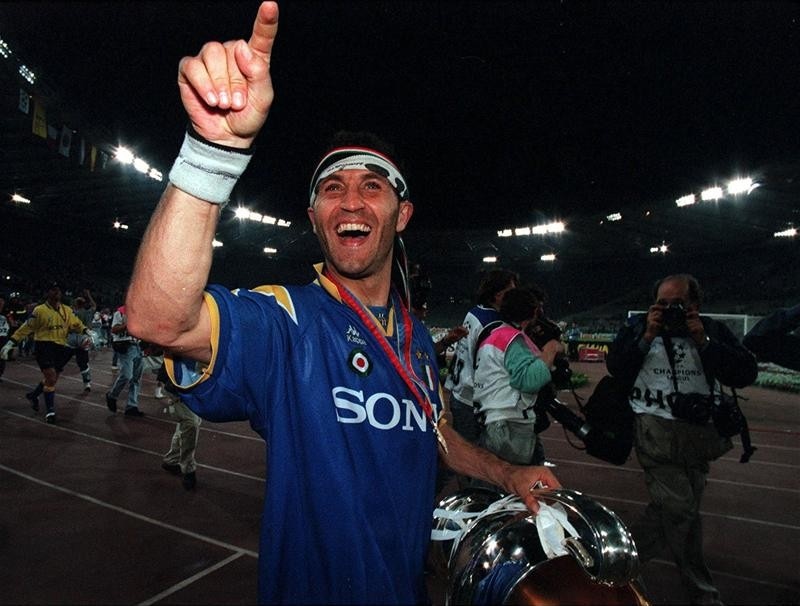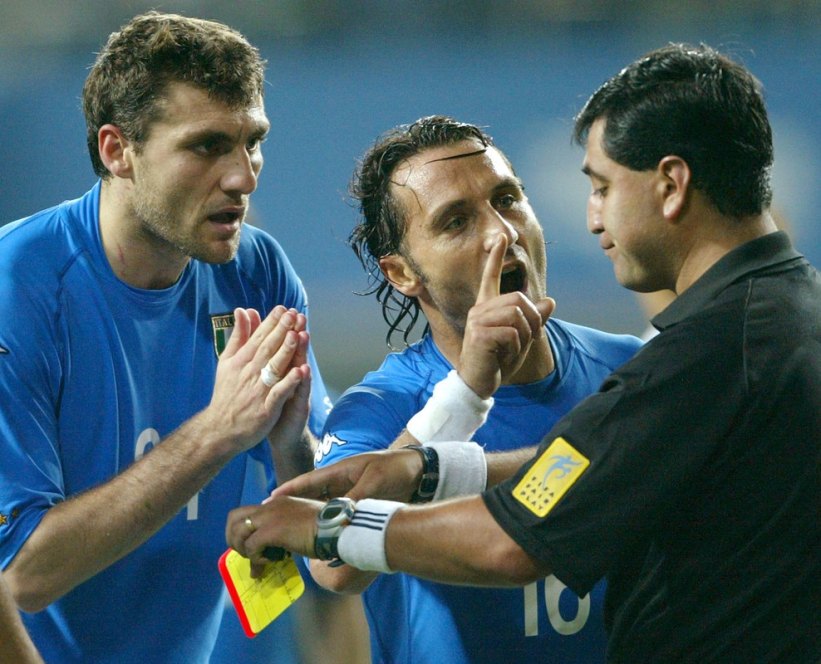Angelo Di Livio is a joke.
That is harsh on a man who won three Scudetti, two Coppe Italia and the Champions League, but the former Juventus and Fiorentina man is the subject of a long running in-joke between me and my friends.
It has become standard practice in email or text conversations to respond to any angry outburst, sense of humour failure or perceived meltdown (think Kevin Keegan in April 1996) by coolly sending a link to Di Livio’s Wikipedia page to the offended party. The precise origins of this practice are obscure and not completely rational, but the Di Livio link conveys a simple message: “You’ve lost it mate, you need to calm down. You are very upset while I remain completely calm”. The implication, it seems to me, is clear: only a man with complete control of his mental and emotional faculties has the time or inclination to think about Angelo Di Livio.
The reasons Di Livio does not capture imaginations more frequently are not hard to fathom. He spent 10 seasons in Serie A with Juventus (1993-1999) and later Fiorentina (1999-2005) and went to four major international tournaments with the Italian National Team. Yet, despite all of this, even relatively close followers of calcio during that period may struggle to summon many specific memories of him. He scored 8 top-flight goals in total, never more than two a season, and it is hard at times to be sure what position he played. I tend to think of him as a defensive central midfielder, coming on late in tight Champions League ties to see out the game, but he actually played more often as a right midfielder or at fullback.
The most enduring image of Di Livio in an Italy shirt is probably of him remonstrating with Ecuadorian referee and Italian hate figure Byron Moreno, after he sent off Francesco Totti on the way to Italy’s elimination from the 2002 World Cup by South Korea. For me Di Livio represented – along with the likes of Gianluca Pessotto, Alessio Tacchinardi and Antonio Conte – the abundance of technical and tactical quality, if not brilliance, enjoyed by Juventus and, by extension, Italy during the mid-to-late nineties, the kind which Italy seems to have lost and England has never really had.
A YouTube search for further evidence of Di Livio’s contribution is as fruitless as it is telling. There are only two real videos of his playing highlights, one for Juventus (fan made, duration 5:20) the other for Italy (official, duration 1:23). Clearly YouTube is not the best way to judge a football player as anyone who has been briefly excited and then rapidly disappointed by their club’s latest signing will confirm. But the lack of clips tells us something about the type of player we’re talking about.
Both consist largely of footage of Di Livio making crosses into the box which result in shots but not always goals or making defensive clearances. Even by the standards of a defensive player, there is little evidence of dramatic interventions: last gasp tackles and goal line clearances are apparently in short supply. A substantial portion of the Juventus video is just footage of him larking about with more celebrated teammates: Del Piero, Vialli, Zidane.
A furious Di Livio, alongside Christian Vieri, confronts referee Byron Moreno
Although part of Di Livio’s appeal arose from his tactical versatility, for me that doesn’t fully explain his success. He was virtually an ever present for Juventus during his six seasons there averaging over 31 league appearances per season compared to Conte’s 23. This was a team that got to the Champions League Final three years in a row, as dominant as any team has ever been, there was no room for also-rans. Moreover, under four different CTs Di Livio made 40 appearances for the Italian national team, double that of the more feted Conte (20) or similarly versatile Pessotto (22), despite not receiving his first call-up until the age of 29.
Di Livio’s nickname was Il Soldatino (the “Little Soldier”) apparently given to him by Juventus teammate Roberto Baggio because of the way he ran up and down the wing: chest out, shoulders back, arms by his sides. However, it’s hard not to read more into a nickname like that, especially when one considers the man who gave it. Baggio and Di Livio were born six months apart and were the same height but in almost every other way they were opposites: Di Livio was technically limited while Baggio was peerless, Di Livio was physically robust while Baggio was injury prone and perceived as lightweight, crucially Di Livio would go out and give his all for the team in whatever role he was assigned while Baggio was regarded by some as prima donna who needed the team to be built around him.
When you look at it this way Il Soldatino is less about a particular style of running than a sense of tactical discipline, physical sacrifice and grit, combined with a remarkably good disciplinary record (Di Livio was sent off only once in all of his time at Juve). When Fiorentina went bankrupt and was relegated to Serie C2 in 2002 he was the only player to remain with the club, captaining the Viola to consecutive promotions back to Serie A. That’s the sense in which Di Livio was regarded as “a soldier”. That obvious level of commitment also explains how a lifelong Roma supporter could become a Juventus stalwart before moving to hated rivals Fiorentina while maintaining the respect of all three sets of fans.
It is also no surprise that Di Livio enjoyed good relationships with stern disciplinarian coaches like Marcello Lippi, Arrigo Sacchi and Giovanni Trapattoni, precisely those managers with whom Baggio had such regular fallings out. On that basis, is it unfair to detect a note of snark in Baggio’s nickname for his teammate? The ‘little soldier‘ who keeps his place by following the boss’ orders while the superstar does his own thing and suffers the consequences.
Di Livio’s popularity also tells us something about those managers and about Italian football in general. That being the importance of tactical discipline above all else, which has made players like Di Livio, Conte and, more recently, Emanuele Giaccherini more successful than their talents would seem to allow. On the other hand, mavericks like Baggio, Cassano and Balotelli have often failed to win the trust of their coaches and live up to their obvious gifts.
It is entirely fitting then, for any young man who has lost his temper to be presented with the opportunity to consider the example of Il Soldatino and the benefits that can come from self-discipline.
Words by Ricci Potts:@sttopr


